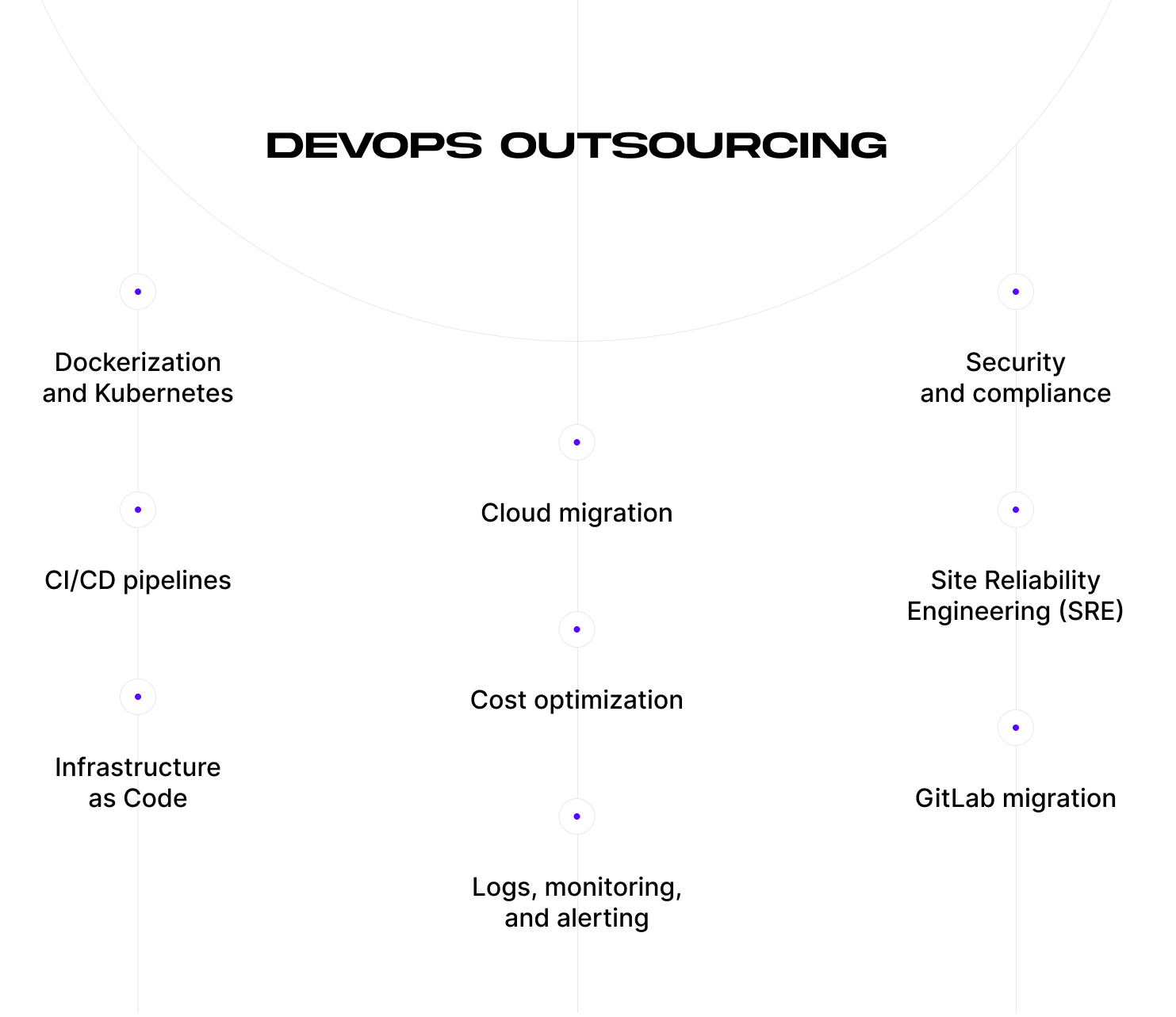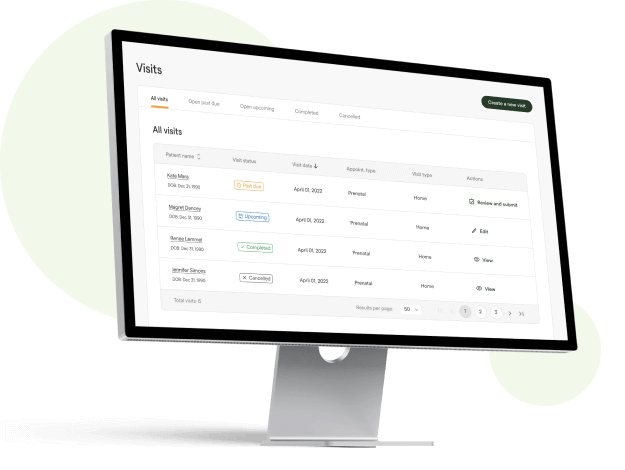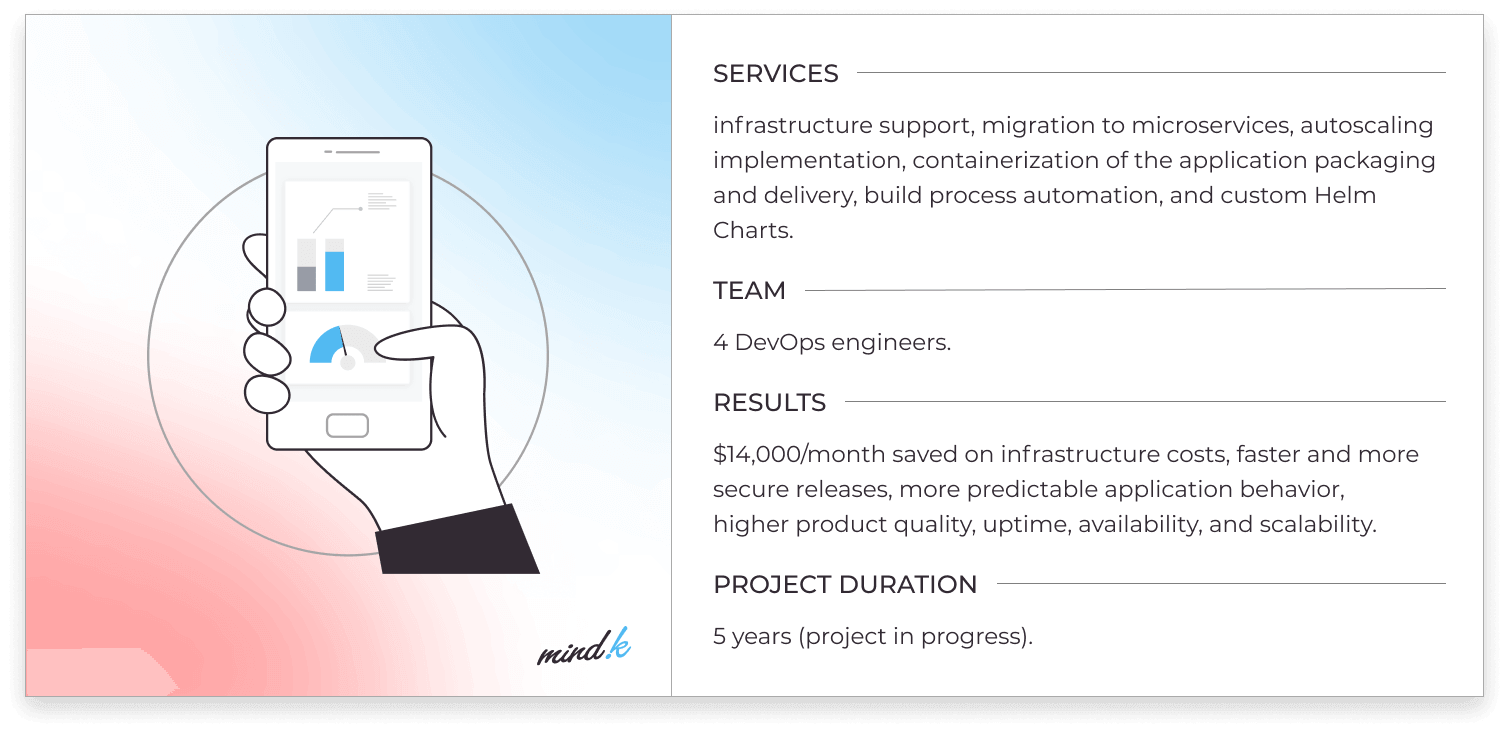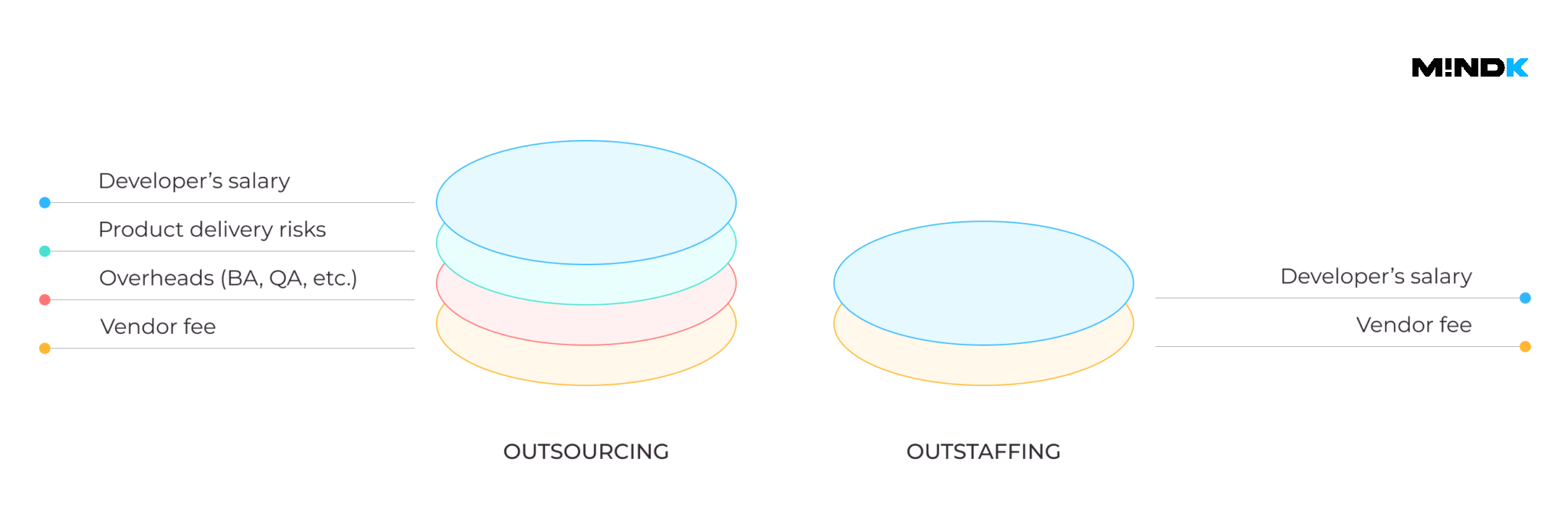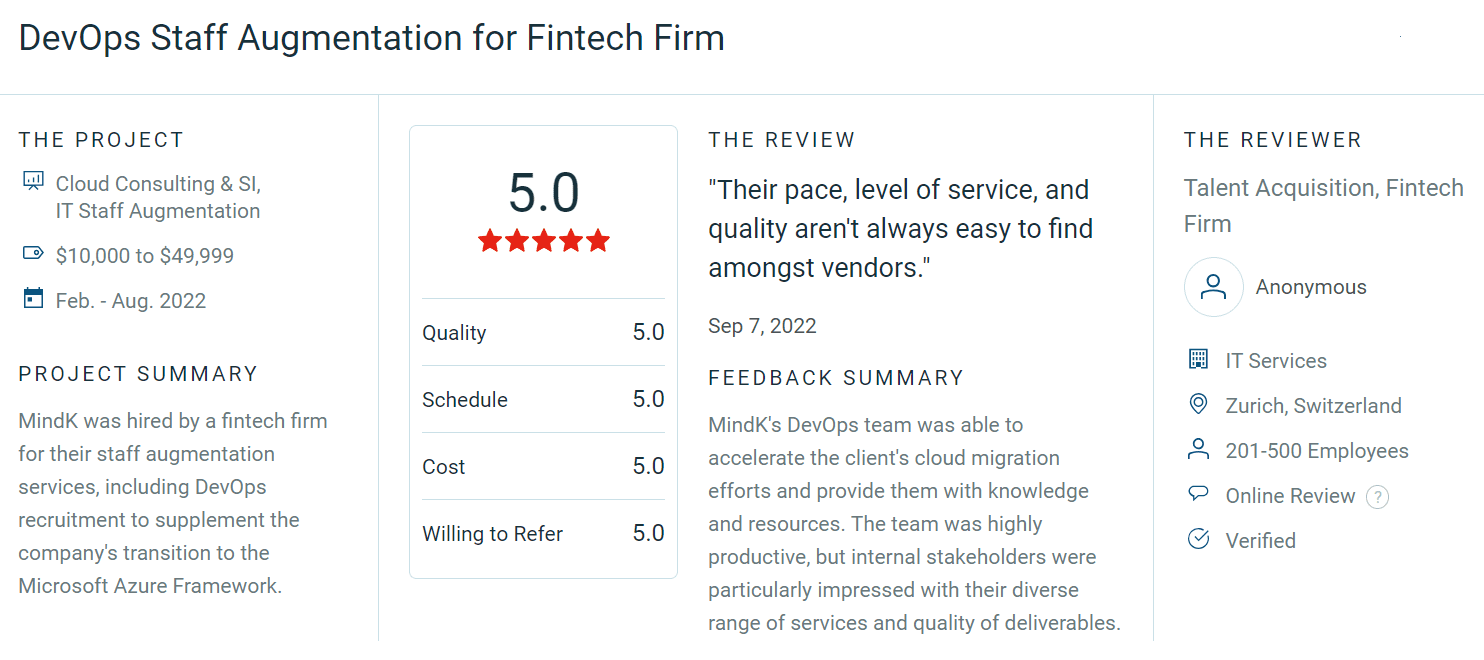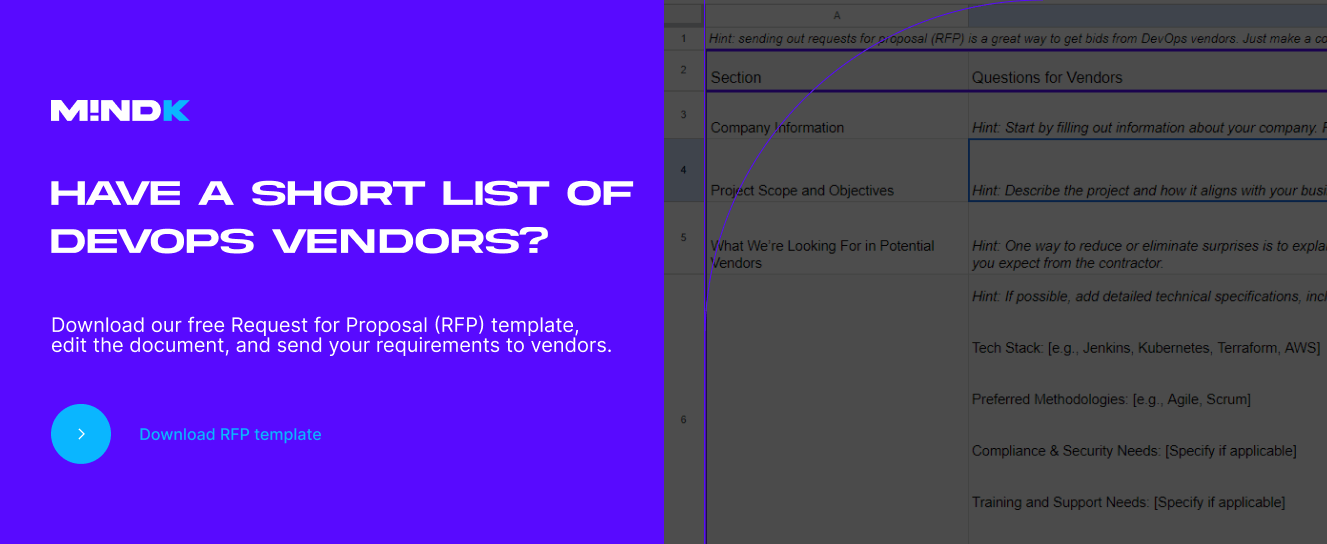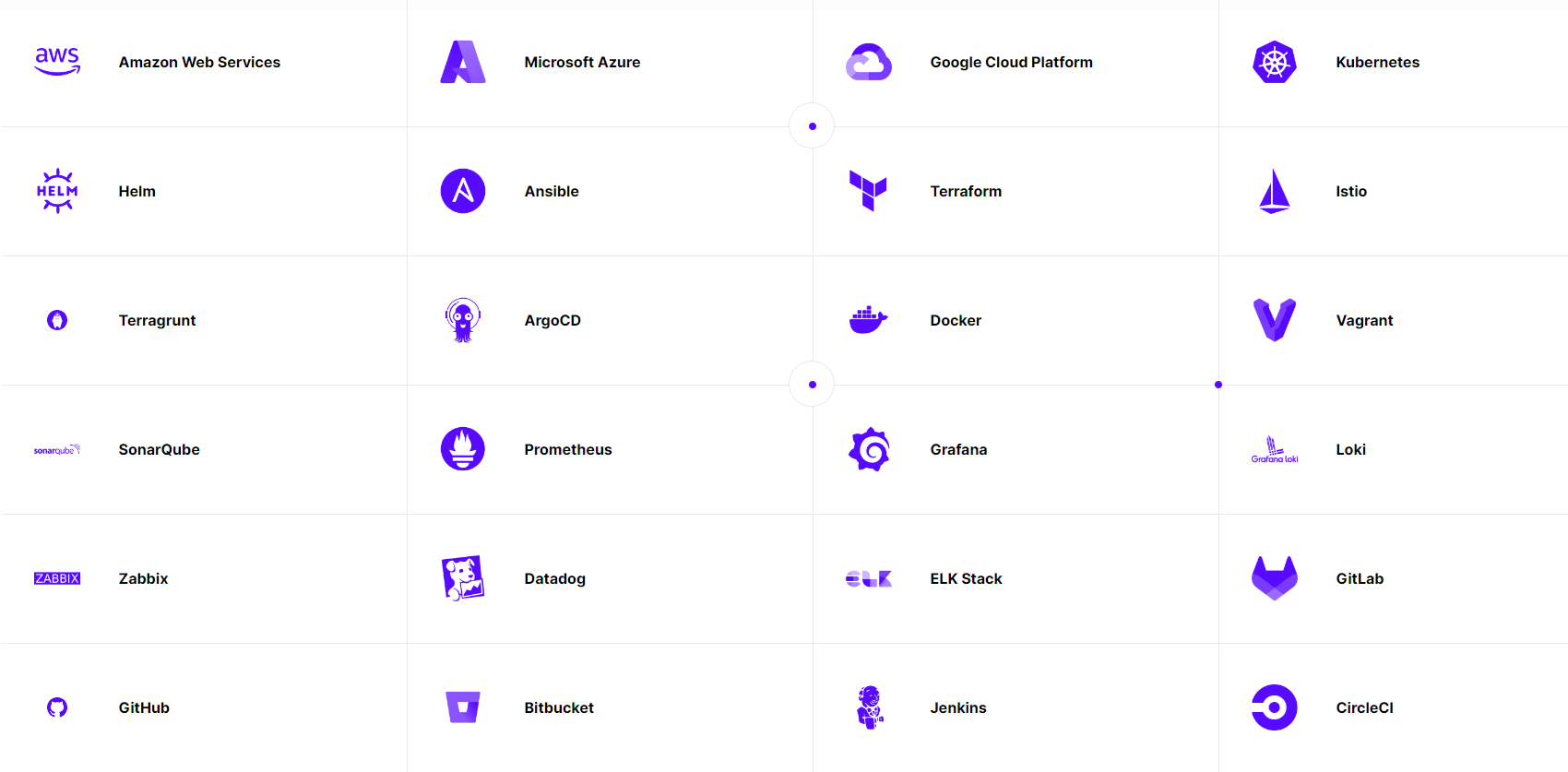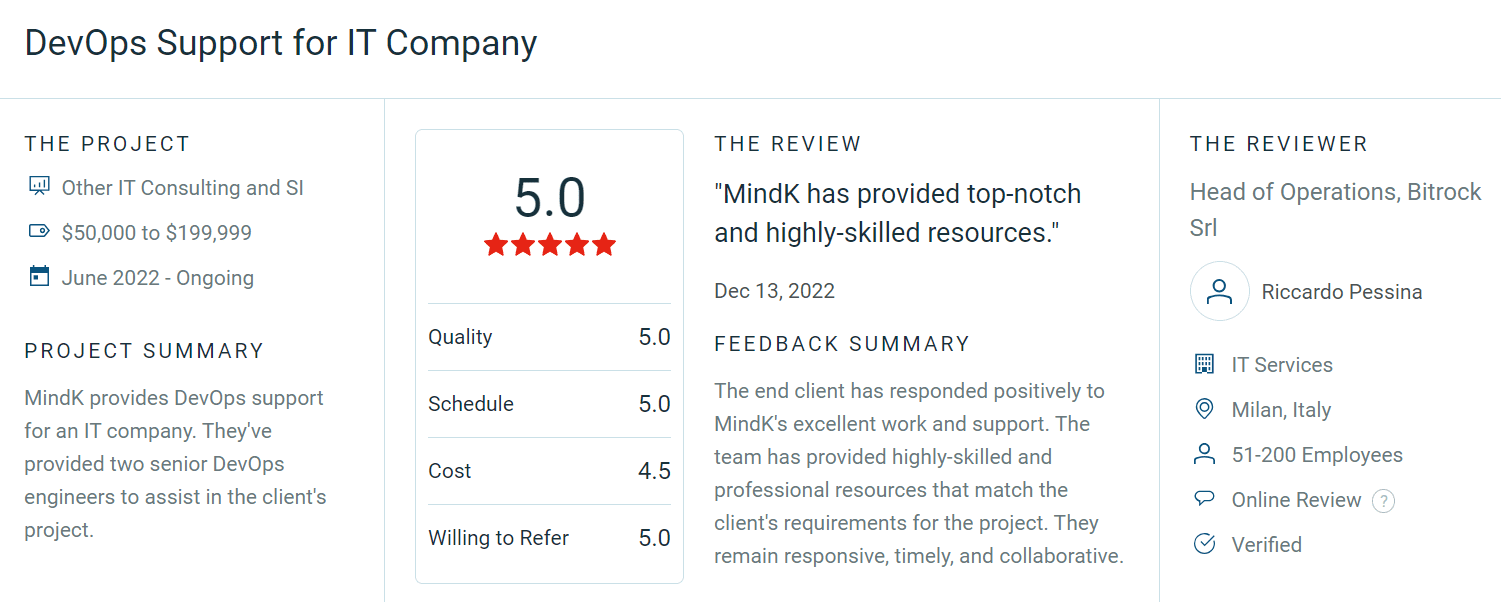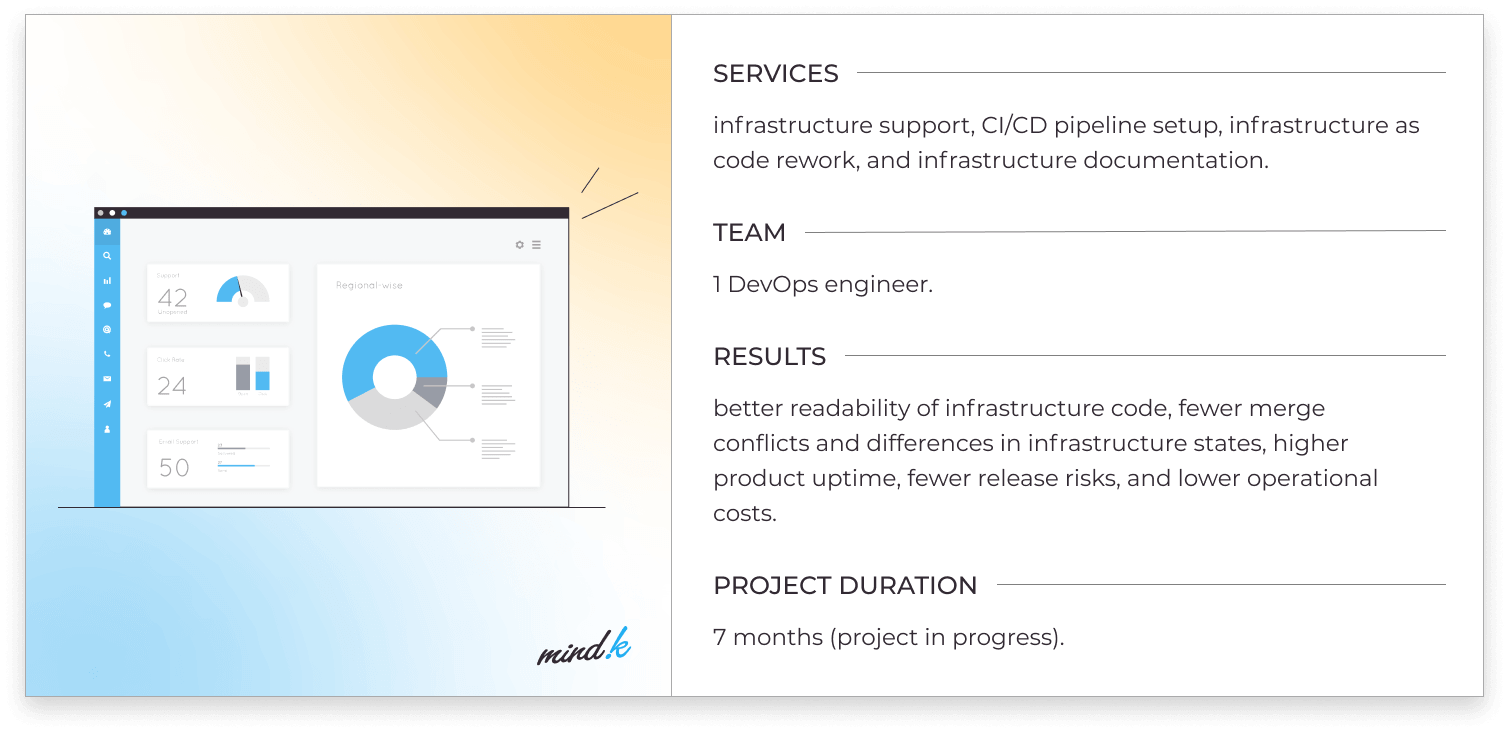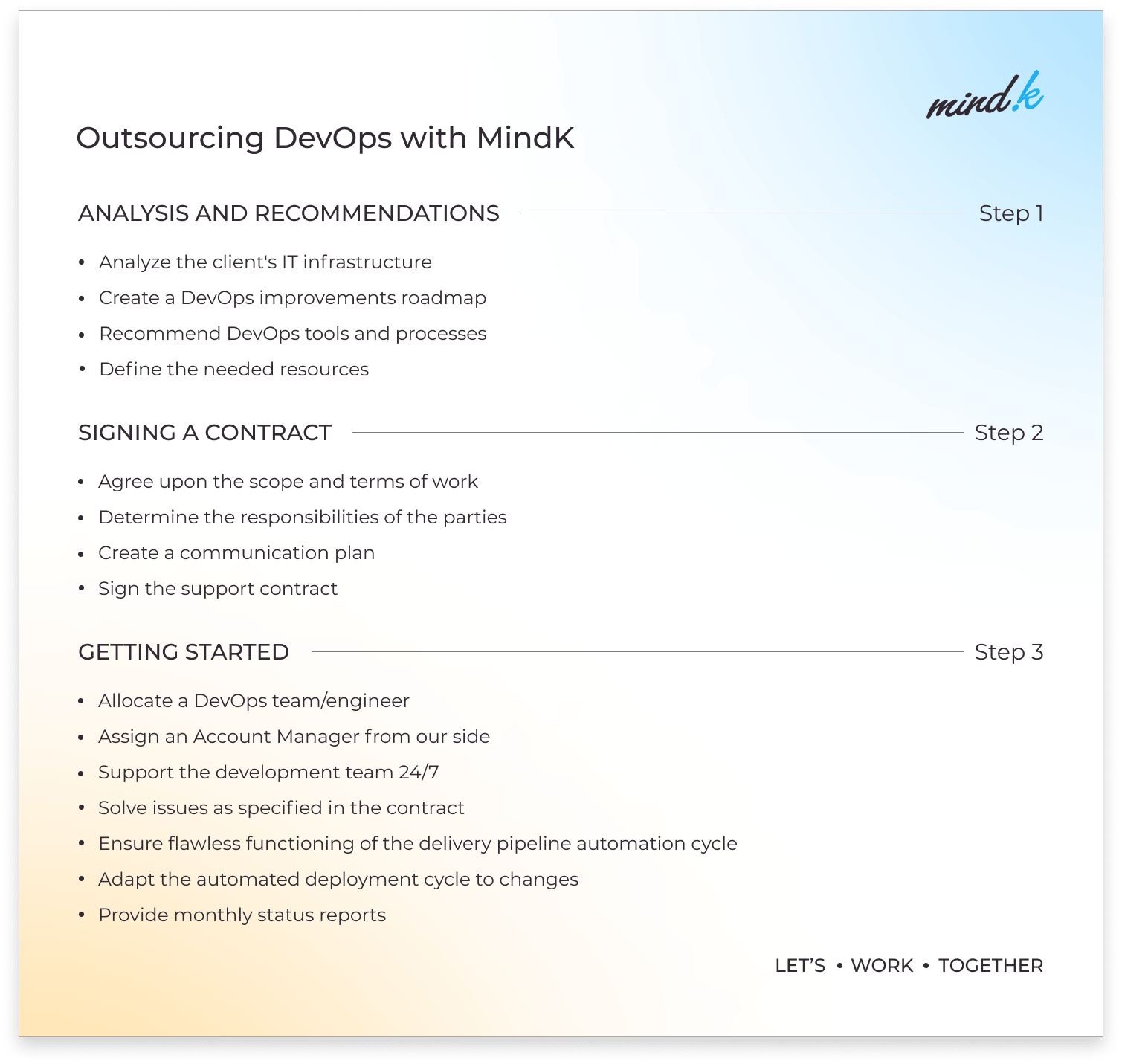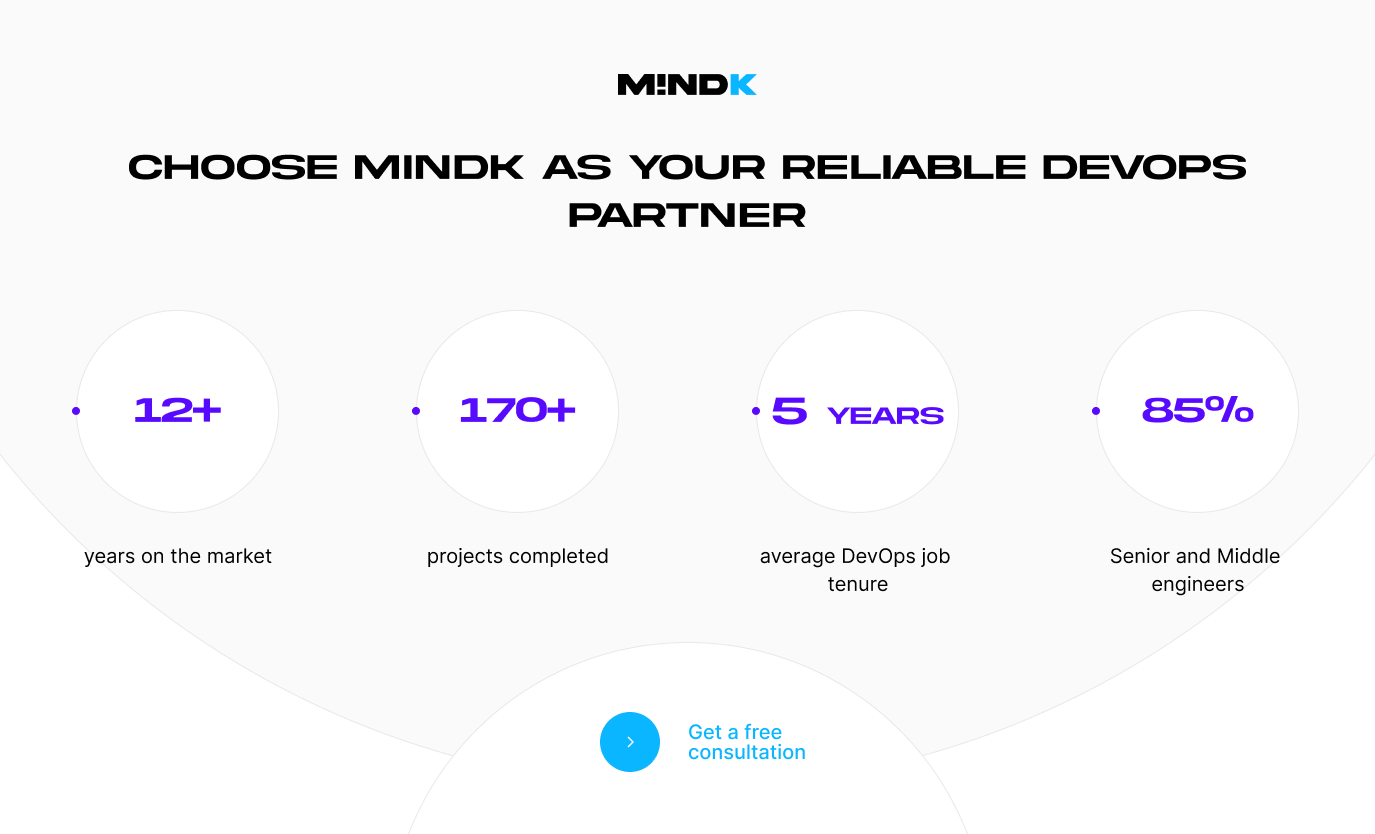DevOps outsourcing used to be a great way to augment your team with in-demand skills. Infrastructure as Code, CI/CD, K8s, observability, security automation, and MLOps expertise is still scarce. After all, companies like WhatsApp, Slack, GitHub, and Nokia have all, at some point, relied on remote IT contractors.
Some of them still do. Yet in 2025, the market still hasn’t recovered from massive layoffs. So why would you risk working with a DevOps vendor when you have so many engineers looking for a new job?
Over the past 8 years, I’ve worked with dozens of DevOps engineers. Both in large in-house teams and in DevOps outsourcing companies like MindK. From my experience, partnering with a reliable vendor gives you two key advantages. And saving money is just one of them.
In-house teams vs DevOps outsourcing services
The business case for DevOps methodology remains clear. In 2024, DevOps was the second most sought-after tech skill among US recruiters. Yet, only 11% of teams possess high-performance DevOps skills.
These teams report 417x more deployments, delivering products faster than competitors. They also have up to 4x lower failure rates and 30x faster recovery times. Their products are much more stable.
All of this affects a company’s bottom line. So should you hire an internal team or outsource services to a trusted provider? Both have advantages and disadvantages.
Learn about DevOps outsourcing services at MindK
An argument for keeping your DevOps in-house
Outsourcing is a risk, there’s no way around it. Loss of control, information leaks, and unforeseen costs can all manifest if you don’t know how to mitigate these risks.
When working with freelancers, in particular, there’s no guarantee a DevOps engineer won’t simply disappear one day into a thick fog. I’ve seen such a thing happen to a fast-growing neobank from Benelux. High turnover resulted in a poorly documented and unstable infrastructure that was a huge pain to maintain.
It’s also pretty much impossible to enforce NDAs with individuals from countries that operate under vastly different laws.
Working with DevOps outsourcing companies is safer. For one, they’re legal entities and care about their reputation. They also try their best to decrease employee turnover.
Still, there’s a risk a DevOps engineer will divide attention between several projects. There’s no solution for this issue, aside from using an activity tracker of some sort.
In-house DevOps benefits | In-house DevOps drawbacks |
➕Complete control over each aspect of the product development. | ➖Office costs, employee perks, and benefits. |
➕Lower risks if you can maintain low employee turnover. | ➖Most in-house engineers focus on a single toolset, limiting their expertise. |
➕Engineers focus on your project alone. | ➖More time to set up the needed infrastructure and processes from the ground up. |
An argument for outsourcing DevOps services
Most of the time, in-house experts focus on just one industry or project type.
I’ve seen DevOps engineers spend the last three years working on a single FinTech application that sits somewhere on a dedicated server. They only know a single CI/CD and automation tool as experimenting is too costly for the employer.
Contrast that with DevOps outsourcing companies like MindK. My colleagues might one month create Infrastructure as Code (IaC) for a recruiting startup. Once the task is done, they’d join a FinTech project to simplify compliance with on-premises GitLab instances.
The result is more experience with various CI/CD tools and automation tools, cloud providers, IaC technologies, and so on. With expertise in both legacy and modern tech, you can pick optimal tools for each project.
For example, I now work on a medical system with more than 400 resources described in Terraform. With a serverless approach, we don’t have to pay for unused services, saving up to 50% of the infrastructure support costs. However, if you anticipate heavy usage, it might be smarter to go for a dedicated server.
A cloud-native medical system we built for our American clients
This vast expertise is the main advantage of DevOps outsourcing. Cost is another big one, which I’ll discuss next.
As for the downsides, there’s a way to minimize the risk of engineers leaving your project. Logical Infrastructure as Code makes it much easier to bring on another person to manage your infrastructure. This is true both for outsourced and in-house DevOps.
Outsourced DevOps benefits | Outsourced DevOps drawbacks |
➕Immediate access to top-tier talent at lower costs. | ➖Freelancers can work on multiple projects at the same time. |
➕Experience with a wide range of projects and technologies. | ➖Inexperienced engineers might compromise application security. |
➕Easy team scaling without administrative or recruiting expenses. | ➖Without a legally binding contract, there’s a risk of abandoning your project. |
DevOps outsourcing types and pricing
According to the latest study, 83% of CIOs feel pressured to deliver more with less in 2024. So smart budgeting is of the highest priority.
When you account for overheads and benefits, a DevOps engineer in California might cost from $59 to $104 an hour.
Rates for DevOps outsourcing companies vary greatly between countries and regions. For a top-tier engineer, expect to pay around $40-$80 an hour.
So now let’s look at three main types of DevOps outsourcing.
DevOps consulting
Pricing: Time & Material.
A short-time engagement with a flat hourly rate.
DevOps consultants typically analyze the current state, quality, and pain points of a customer’s IT infrastructure. Based on the analysis, we draw a roadmap and recommend the best tools for the purpose.
What problems could you solve with outsourced DevOps consulting services?
- Slow, error-prone, and unstable deployments.
- Low productivity with a lack of automation.
- Difficulties in scaling your application cost-effectively.
- Problems with security, HIPPA, PCI-DSS, and CIS audits.
- Operational costs spinning out of control.
38% of CIOs reported large overspending due to rushed cloud migrations during COVID-19. I once joined a massive SaaS project with 50+ on-demand EC2 instances. The lack of optimization cost our client over $14,000 a month! After discovering the issue, our team fixed the problem by merging services that didn’t consume computation resources 24/7, scaling down pods in off-hours for Dev and Test environments, and implementing auto-scaling with AWS Spot Instances.
Key takeaway: DevOps consulting is ideal for solving a specific challenge with the help of DevOps experts.
Saving $14,000 a month on cloud infrastructure [case study]
Staff augmentation
Pricing: Time & Material.
Hire DevOps engineers to work as a part of your team for as long as needed.
You pay the engineer’s hourly rate and manage their activity. An outsourced specialist will adopt your favorite tools, approaches, and culture. Staff augmentation is typically cheaper than other models. After all, you don’t pay for overheads and risk management.
Such DevOps specialists are used to geographically distributed teams. They can support any team – whether they use JavaScript, Python, or Go – working from the West to the East Coast, Europe, and Asia. You obtain on-demand access to top-tier talent at a fraction of the cost.
Take, for example, Yokoy – a Zurich scaleup that wanted to migrate its AI spend management app from GCP to Azure. Despite having 200+ employees, the company lacked both expertise and manpower for the task. By working with MindK, Yokoy hired the right DevOps engineer in less than 14 days. He helped them set up the cloud department, allowing Yokoy to focus on security and other key areas of the business.
When the task is complete, a client can easily scale down the outsourced team.
Key takeaway: staff augmentation is a flexible and cost-effective solution for long-term DevOps outsourcing.
Dedicated team
Pricing: Fixed Price; Time & Material.
Managed DevOps services can be a part of a larger outsourcing project. Besides Time & Material, it might use a Fixed Price model. You know the budget and timeline in advance, while the vendor takes on all risks.
A good example is a Choo member management system. Initially, the Norwegian company developed a separate project for each client using the LAMP stack. Scaling and adding new clients got pretty expensive. We migrated all those projects to a single microservice application with minimal adjustments to the code. Onboarding new customers became 10x cheaper.
Thanks to Kubernetes and IaC, we lowered the business expenses on dynamic workloads (operations that require lots of computational power for short amounts of time). The team reduced operational costs, improved development efficiency, minimized bugs and downtime.
Key takeaway: dedicated teams reduce the risks of DevOps outsourcing and provide you with a defined budget + timeframes.
How to outsource DevOps with minimal risk?
Selecting a reputable vendor is half the battle. Here’s how to win it in 5 steps.
Step 1: Define your goals and scope
Begin by clearly defining your DevOps goals and specific areas to outsource. Understand your project scope, desired outcomes, and the desired level of control. This step is crucial to align expectations and ensure a smooth collaboration.
Editable RFP template from HubSpot (PDF) / Copy the MindK RFP template (Excel)
Step 2: Assess vendor expertise and experience
A vendor with a solid history of successful projects is more likely to provide the expertise you need. Here are the things to look for in a reliable DevOps partner:
- Technical proficiency
A reliable vendor should understand key DevOps principles. They must know popular tools like Docker, Kubernetes, Ansible, Terraform, and various CI/CD options.
MindK tech stack
- Industry expertise
Look for a track record of successful DevOps projects in your industry. MindK, for example, has worked with companies in Healthcare, FinTech, Education, Advertising, Sustainability, Real Estate, and other industries. Vendors who pass the test will better understand your specific requirements and compliance needs.
- Scale and complexity of previous projects
Evaluate the scale and complexity of past projects. Request detailed case studies. Not every vendor has experience implementing the GitOps approach in large enterprise teams or uses in-house Terraform frameworks for standardized project structure. Researching project complexity also showcases the vendor’s adaptability to diverse project environments.
- Client testimonials and references
Requesting client testimonials and references can be invaluable. Look at independently verified review platforms like Clutch. Contact the clients yourself, if necessary. You’ll learn about the vendor’s performance, communication, and problem-solving capabilities.
And don’t forget to note their communication style. After all, a good culture match is important in collaborative DevOps.
Step 3: Scrutinize security and compliance measures
Security is paramount in DevOps outsourcing. Especially, when dealing with sensitive data and mission-critical systems.
Ensure that the vendor adheres to industry-standard security practices and complies with relevant regulations. Assess their data protection policies, encryption methods, and overall cybersecurity posture. Request documentation on their compliance with standards like GDPR, HIPAA, and CPRA.
Step 4: Sign a legally binding contract
Together with the vendor, agree upon the scope of work and terms. Determine the parties’ responsibilities with the provider’s help. Work out the communication plan, and confirm the arrangements with a contract. At MindK, we also recommend an NDA to protect your IP and confidentiality.
Step 5: Maximize your Infrastructure as Code (IaC) coverage
As I said earlier, well-implemented IaC makes it easier for new engineers to take over the project – even if you have a high turnover. Instead of manually setting up servers, networks, and other resources, IaC uses code to define and automate these processes.
Besides reducing the risks, it allows you to rapidly create, modify, and replicate infrastructure. You can track and manage changes to your infrastructure with version control. In essence, Infrastructure as Code is a powerful tool that leads to higher consistency, scalability, and better business outcomes.
Rewriting Infrastructure as Code for a fast-growing FinTech [case study]
What to expect from a DevOps outsourcing company like MindK?
Each project is unique. So the customer and DevOps services provider discuss the scope of work and agree on responsibilities on a case-by-case basis. But here’s a general trajectory you can expect.
#1 Immediate access to top talent at a reasonable cost
At MindK, we analyze the current state, quality, and pain points of DevOps implementation in a customer’s IT infrastructure. The analysis also shows the number of resources needed to cover client demands. We could then provide a single DevOps for support or a team of full-time engineers.
The lack of local specialists and increasing costs are two reasons startups consider outsourcing DevOps responsibilities. Outsourcing providers typically have a well-established recruitment process to hire the most experienced specialists. MindK, for example, accepts only 4% of qualified candidates that stay with us for 5 years on average.
#2 Faster delivery of a better product
Outsourced DevOps developers typically work in companies that breathe DevOps culture. Such teams are more productive and experienced with cross-functional Agile teams. A well-coordinated team is able to shorten the development cycle, speed up recovery from failure, and time-to-market.
Here’s a sample of tasks you can request from an outsourced DevOps team:
- Migrating your application to the cloud.
- Automating CI/CD pipelines.
- Implementing microservices and container orchestration.
- Creating Infrastructure as Code.
- Carrying out thorough disaster recovery plans.
- Supporting your infrastructure long-term.
- Monitoring and SRE services.
#3 Reducing risks and IT expenses
A remote team of DevOps consultants, as a rule, takes on the financial risks of providing a service. It’s almost a guarantee that such a team has already engaged in a large number of different projects for companies in various industries.
This allows them to be sure which tools and approaches work best for a particular project.
The potential risks of outsourcing can be foreseen and, most importantly, shared between you and the DevOps services provider. With enough homework, DevOps-as-a-Service can be as risk-free to the business as an internal team.
Conclusion
DevOps outsourcing may seem risky. Yet, the precautions I described can make it a reliable option for a long-term partnership. It can provide immediate access to rare specialists with hands-on experience on multiple projects and infrastructure types. It can dramatically reduce operational and staffing costs. Finally, it can serve as a powerful catalyst for the transformation of your business.
Eight years ago, DevOps became an integral part of each and every project at MindK. Since then, our engineers have worked out a battle-tested combination of processes, tools, and approaches that deliver measurable results for our clients.
Want to explore DevOps outsourcing services in 2024? Feel free to drop us a line and schedule a free consultation with our experts.

